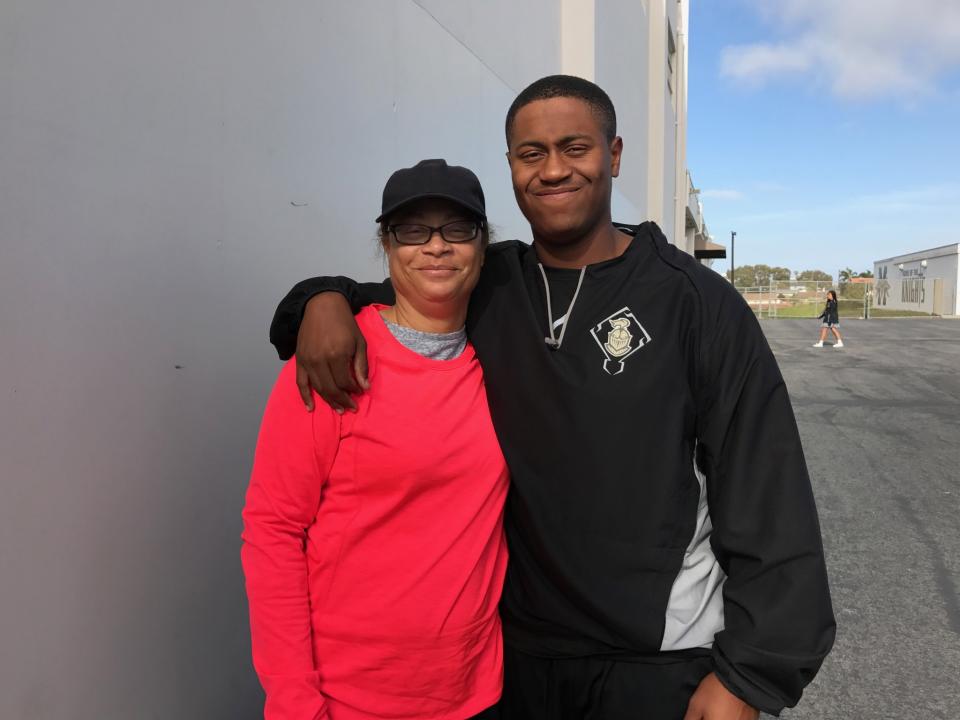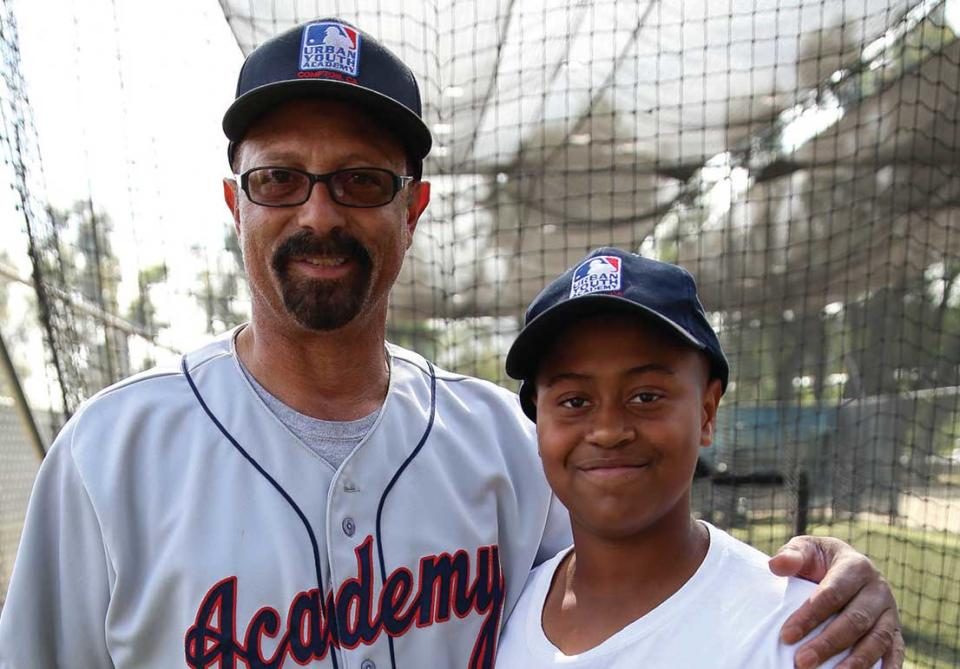Mother’s Day: Sometimes it's about the baseball too

TORRANCE, Calif. – George Eaves doesn’t have it all planned just yet. He is thinking maybe he’ll cook her breakfast for Mother’s Day. Eggs, turkey sausage, toast and fruit. No orange juice though.
“She stays away from orange juice,” he says. “Says it’s too acidic.”
Otherwise, he says, “She’s not too picky.”
Sometimes she shoos him out of the kitchen. Too much loitering in her kitchen puts her on edge, much as she loves her family around, much as she favors it to the alternative. Sometimes, you know, she needs her space, proud as she is of her work there, much as she needs them there.
“When you’re poor, you cook,” she always says. “And we love to cook.”
She laughs.
“We’re OK,” she says. “We struggle. But we got each other.”
So, breakfast in the morning. Then, if she wants, she could get her nails done. After she opens her card. And gets her flowers.
“I have money,” he says. “Mm-hmm. Birthdays and Christmases.”
LaShawn Gilmore, George’s mom, catches a little something in her throat, swallows it down, keeps her smile.
“It gets hard,” she says. “But George is so pleasant. He’s so easy. He does everything.”
***Afternoons here, the ocean breeze becomes a gale, rising from beyond the football bleachers, hurtling the temporary fence in left field, whistling across yellow-green grass that is fighting for its life, and plowing straight into the heart and psyche of the right-handed hitter.
George Eaves chews at the dirt with his right foot, his back foot. He’s 16, just turned. He’s bigger than most his age, always has been, and he draws back an aluminum bat with learned authority.
The boom box propped outside the third-base dugout thumps and shudders.
“Not my playlist,” Eaves’ coach confirms with a grin from behind the pitching machine. He holds up the next ball. “Just so you know.”
They know.
It’s a light day for the Bishop Montgomery High School baseball team in Torrance. The regular season is over. Playoffs start next week. The players are allowed to wear shorts on light days. The wind whips the shorts against their legs and threatens to unmoor their caps. Batting practice balls are aged, frayed, smudged with dirt and grass, waterlogged and generally undisposed to carrying any farther than they absolutely must. One of those balls in the air is accompanied by cries of “Did you!?”, and it’s an old joke, because the last ball that cleared one of those fences in the afternoon had to have been hit, picked up, and hit again.
As he awaits his first BP fastball, this is what George Eaves is up against.
***LaShawn Gilmore has two children. Yuri, her daughter, is 25. She is scheduled to graduate from Cal State Northridge on May 20. So, late May, it is mused.
“May 20,” she corrects.
The day is too important to lose in vagueness. Yuri is the first, LaShawn says, “In my circle,” to graduate college. LaShawn ran track and played basketball at Westchester High School, not far from Los Angeles International Airport. Her father, she says, a man she is told was kind and responsible, was killed by a drunk driver when LaShawn was 4.
“I have no memories of him,” she says.
His name was George.
Out of high school, LaShawn went straight to work for McDonnell Douglas, which became Boeing. She was married, had a daughter, had a son, and was divorced. That was 16 years ago, and George’s father, she says, has been mostly absent since. About the time her son reached school age, Boeing laid her off. She went to work for a construction company – GWG Construction. She’s been there since, working her hours, raising her children, fretting a world for them outside the three-bedroom house she rents in Gardena, which lies due west of the Pacific Ocean and due east of Compton.
When George was 4, his mother sat him down and announced he would pick two sports to play. He chose football and basketball. She nodded. Then she announced she also would choose two sports for him, and he would participate in those, too. Those were gymnastics and dance.
“I knew he was going to be a big boy,” she says. “But he has good feet.”
Twelve years later, George is a third baseman, and built like one.
“But,” she says, “he is a great tap dancer.”
***About a decade ago, Major League Baseball built a baseball facility in Compton for George and for LaShawn. Every brick. Every pipe. Every square foot of sod and dirt. Every water faucet. Every bench. Every rendering that imagined structures and parking lots and outfield gaps, that imagined stability and direction and hope and shelter, for George. For LaShawn.
The sign out on the scoreboard says Major League Baseball Urban Youth Academy. Beneath it, they may as well have added, “Welcome George. Welcome LaShawn.”
They arrived when George was 10. He was a chubby, oddly agile kid, quiet and respectful, quick to smile and eager to learn. His mom walked neither ahead of him nor behind him, but alongside her boy, the two of them in this together, she however clearly in charge.
“If George gets out of line,” she told them, “you slap him upside the head. You have my permission.”
Kenny Landreaux, the academy’s coordinator of baseball instruction, nodded and took George by the shoulder. Landreaux was born and raised just a few blocks from these ball fields, when there wasn’t ball fields here at all. He remembers what this neighborhood could do to a boy, what it can still. He became a big leaguer. Not all of them will. In fact, damned few of them well.

George never has gotten out of line.
“Nope,” Landreaux said. “He’s a good kid.”
George took to Landreaux, and to the other coaches, to Lorenzo Gray, a big-league third baseman once, and James Bishop.
“Suit up and show up,” they’d say, and while they’d say it in a locker room or on a diamond, they’d mean it for all venues – home, school, church, wherever.
“I was a little bit nervous,” George says of his first days at the academy around all these new adults and ballplayers. “But I knew it was going to be a place for me. The staff was nice. They treated me with respect and kindness. So I never felt out of place.”
He knew when he was young there would be things he would not be able to do, that cost too much in money or time. His mom was honest about that. There would be only one paycheck for all of them, and she’d stretch it for them as far as she could, but there would be disappointments. There also would be love, as much as she had, and she promised she would find ways to keep them close and safe.
“I knew early it was hard for her,” he says. “She had to do everything. She tried her best.”
George signed up for the baseball. He signed up for the free after-school tutoring. Recently, he signed up for the SAT workshops. Those cost $25 for the supplies. He signed up for a place that was not lost in a world that can scoop up boys and girls, that can scrub their spirit, their curiosity for what may be out there for them. He stood beside men who suit up and show up and expect the same of him.
Over these six years, they’ve seen him sad and lonely. They’ve seen him laugh, now through braces on his teeth. They’ve seen him become a ballplayer too, and even taught him to switch-hit. And they’ve seen him grow into the young man who shows up, suits up, and plans a breakfast for Mother’s Day.
“It helps,” LaShawn says. “Oh my God, it helps. First, let’s thank God for that place. He put it there.”
Then, she says, about the people in that place, about men such as Lorenzo Gray and James Bishop and Kenny Landreaux who are there when her boy walks in and there again when he walks out, “He put dads there.”
Darrell Miller is the vice president of youth and facility development for Major League Baseball. He builds academies for the league. He’s also the current director of the academy in Compton. He knows George. He likes George. George is on the cover of one of the academy’s brochures. Kenny Landreaux’s arm is around his shoulders.
“He may or may not be a prospect,” Miller says of George, not because that’s a debate over his skills, but because it’s not all that important.
“This is a chance to access their dream,” Miller says. “They have hope. They can fit in. You don’t have a dad, we’ll be your dad. You don’t have a mom, we’ll be your mom. You don’t have siblings, we’ll be your brothers and sisters.
“Of the boys who come through here, what, one or two percent might be big-leaguers? What about the 98 percent? They get hope.”
***She fights the fear, as a mother would. She sends him to school across town and to the academy in Compton and into the neighborhood on days off, and she fights the fear. She works the snack bars at Bishop Montgomery and the academy. She mans the fundraisers, and even heads up some of them. Those places, the people in those places, are helping to raise her boy, and the least LaShawn Gilmore can do is suit up and show up too.
“I just worry sometimes about my son getting hurt,” she says after baseball practice one day. “I worry about him picking the right surroundings. He sees the worry in me.”
George is standing nearby. She looks up to him. He smiles back.
“He makes sure,” she says, “the worry is less as possible.”
At the academy, she is George’s mom, and they call her Miss Eaves. Her name is Gilmore. She has never corrected them.
Mother’s Day is coming. She’s pretty sure she’ll be doing the cooking. When you’re rich, you see, you cook.
“Everybody at baseball calls me Miss Eaves,” she says and looks again at her boy. “I don’t mind.”


